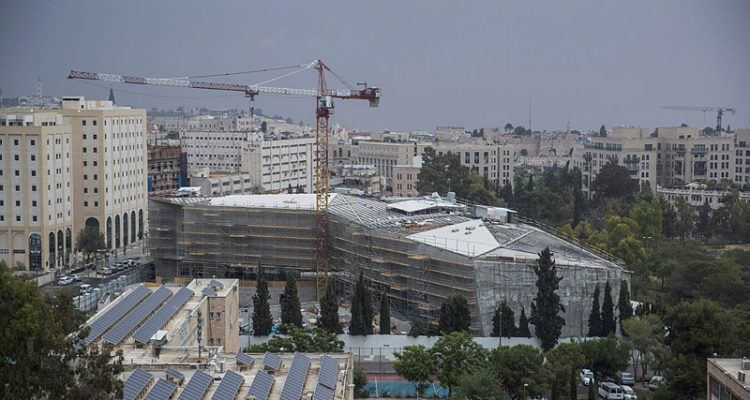The goal of the Museum of Tolerance Jerusalem, to “promote unity and respect among Jews and people of all faiths,” is noble. But how effective will it be in combating anti-Semitism?
By Gidon Ben-Zvi
The monumental $250-million building for the Museum of Tolerance Jerusalem (MOTJ) is scheduled to open sometime in 2020. Spread out over 180,000 square feet, MOTJ will house two permanent exhibition spaces, a conference center, a theater, an educational facility, a restaurant and a book and gift shop. This latest and greatest tolerance museum will focus on global antisemitism, extremism, hate, human dignity and responsibility.
MOTJ’s goal, to “promote unity and respect among Jews and people of all faiths,” is noble. But how effective will it be in combating a new strain of anti-semitism that’s cloaked in opposition to Zionism and criticism of Israeli government policies? The desire to ensure that nothing like the Holocaust ever occurs again anywhere hasn’t beaten back the rising tide of anti-semitism in Europe and the United States.
Another museum of tolerance will do little more than preach sweet-sounding homilies on morality, pluralism, broad-mindedness and tolerance to people who already embrace such values.
The franchising of ‘Never Again’
The Association of Holocaust Organizations is comprised of almost 300 institutional members around the world, each at least partly devoted to commemoration. How many of these organizations that are dedicated to the advancement of Holocaust education, remembrance and research have transformed a Jihadi fighter into a rational humanist? What’s their success rate in reaching out to and re-educating members of the Ku Klux Klan? Have you ever read a story about a man planning to open fire on a synagogue full of worshippers who had a change of heart after walking into the local tolerance museum?
The MOTJ will fail in its mission because its educational and thematic prototype, the Museum of Tolerance Los Angeles, has failed. Holocaust education in the United States doesn’t effectively combat ignorance about anti-Semitism. Two-thirds of American millennials surveyed in a recent poll don’t know what Auschwitz is, according to a study released on Holocaust Remembrance Day. This poll also found that knowledge about the genocide that killed 6 million Jews during World War II isn’t robust among American adults in general, with 22% of millennials saying they haven’t heard of the Holocaust or aren’t sure whether they’ve heard of it.
Tolerance museums are losing the good fight because they’ve turned the murder of a distinct religious, ethnic and national group into a broadside against all forms of racism and prejudice. Anti-Semitism as a uniquely malevolent force has been glossed over in the service of a wider, more fashionable, social justice agenda. ‘Never Again’ has been franchised and become a global brand.
But if everybody is a potential Holocaust victim, every one is also a potential Holocaust perpetrator. The result of such lazy moral calculus is that in the next few months Museum of Tolerance Jerusalem will open for business and start teaching the citizens of a largely Jewish country a dubbed over version of their own history. The images will look familiar, but the messaging will be strangely out of sync in a country where there are an estimated 200,000 elderly Holocaust survivors. Preaching to these survivors and their descendants about their moral obligation to the rest of humankind is worse than misguided, it completely misses the primary lesson of the Jewish Holocaust.
Jews and power: Strange bedfellows
Jews have long had an uneasy relationship with power. While political and military weakness made it possible for them to transform their religion into a purely moral pursuit, it also made Jews vulnerable to scapegoating and violence. Being untethered from the messy business of state-building enabled nations to cast Jews as perpetual targets, the cause of all misfortunes. Many axioms centered around the idea of doing unto others as they would unto you have been grafted on to the Holocaust, but the attempted genocide’s primary lesson is that being stateless, landless and powerless for too long is dangerous, deadly in fact.
This kind of Jewish particularism tends to be greeted with derision by progressive-minded people who consider it an illiberal idea whose time has passed. But viewing Jewish history through a universalistic lens negates the concepts of Jewish survival, Jewish destiny, a Jewish nation. Jews as a people will disappear into history if they continue marching to the drumbeat of multiculturalism instead of dedicating themselves to the perpetuation of national sovereignty.
Tolerance museum? Great idea. How’s about expanding the franchise to cities that could use some enlightenment. Damascus, Mecca, Mogadishu, Pyongyang and Teheran are a few bastions of evil that come to mind.
Jerusalem needs a tolerance museum about as much as it needs another falafel stand.





